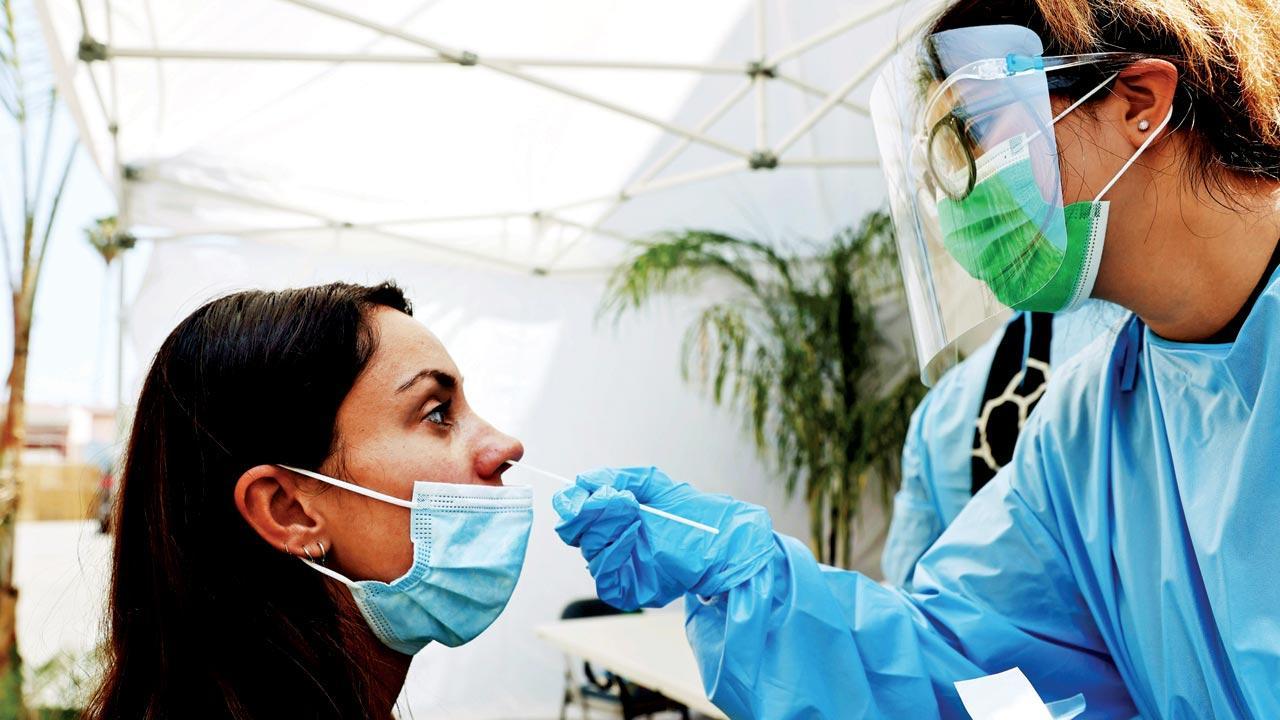WHO chief says virus continues to evolve, causing more transmissible variants

A nurse administers a COVID-19 test to a person at Sameday Testing on Wednesday in Los Angeles, California. Pic/AFP
World Health Organisation (WHO) chief Tedros Adhanom Ghebreyesus on Thursday warned the world about the ‘early stages’ of COVID-19 third wave amid Delta surge. “Unfortunately...we are now in the early stages of a third wave,” he said. On Wednesday, the head of WHO said that Delta variant’s spread, along with increased social mobility and the inconsistent use of proven public health measures, is driving an increase in both case numbers and deaths.
Recalling the sustained decline in COVID-19 cases and deaths that was being driven, in recent months, by increasing vaccination rates in Europe and North America, he sounded alarms over the fresh reversal of that positive trend, reported UN News. Tedros said the virus is continuing to evolve, resulting in more transmissible variants. “The Delta variant is now in more than 111 countries and we expect it to soon be the dominant COVID-19 strain circulating worldwide if it isn’t already,” he said.
Last week marked the fourth consecutive week of rising cases of COVID-19 globally, with increases recorded in all but one of WHO’s six regions. Deaths are also rising again, after 10 weeks of steady decline.
Tedros also drew the Emergency Committee on COVID-19’s attention to the “shocking disparity” in the global distribution of vaccines, and unequal access to life-saving tools, reported UN News. He reiterated inequity has created a two-track pandemic - one track for countries with greatest access to vaccines, and a second track for those without vaccines access who are “at the mercy of the virus.”
It was ‘premature’ to rule out COVID lab leak
WHO Director-General Tedros Adhanom Ghebreyesus acknowledged it was premature to rule out a potential link between the COVID-19 pandemic and a laboratory leak, and he said Thursday he is asking China to be more transparent as scientists search for the origins of the coronavirus.
In a rare departure from his usual deference to powerful member countries, Tedros said getting access to raw data had been a challenge for the international team that traveled to China earlier this year to investigate the source of COVID-19. The first human cases were identified in the Chinese city of Wuhan.
Tedros told reporters that the UN health agency based in Geneva is “asking actually China to be transparent, open and cooperate, especially on the information, raw data that we asked for at the early days of the pandemic”.
He said there had been a ‘premature push’ to rule out the theory that the virus might have escaped from a Chinese government lab in Wuhan - undermining WHO’s own March report, which concluded that a laboratory leak was ‘extremely unlikely.’
“I was a lab technician myself, I’m an immunologist, and I have worked in the lab, and lab accidents happen,” Tedros said. “It’s common.”
Also Read: Mumbai: Officials say decision on allowing public on local trains expected soon
This story has been sourced from a third party syndicated feed, agencies. Mid-day accepts no responsibility or liability for its dependability, trustworthiness, reliability and data of the text. Mid-day management/mid-day.com reserves the sole right to alter, delete or remove (without notice) the content in its absolute discretion for any reason whatsoever
 Subscribe today by clicking the link and stay updated with the latest news!" Click here!
Subscribe today by clicking the link and stay updated with the latest news!" Click here!









